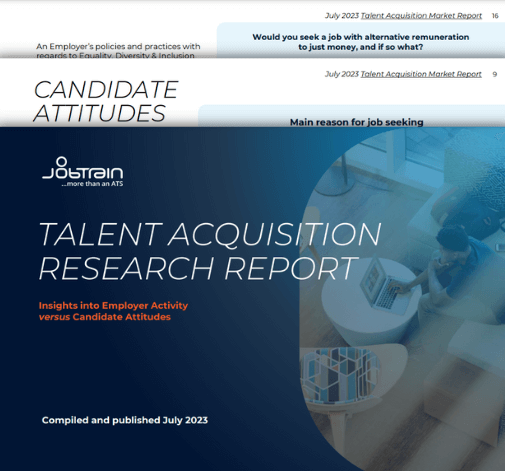For as long as most of us can remember, the recruitment industry has been operating under the assumption that a competitive or high salary is the ultimate draw for potential hires. But attitudes and priorities are shifting and this long-standing belief is now being questioned. Our latest Talent Intelligence Market Report has some eye-opening findings that challenge this traditional viewpoint, especially when it comes to how we reward our employees.
What job seekers are really after
In our July 2023 Talent Intelligence Market Report, 75% of people said they would rather apply for a job that offered a better work/life balance than one that pays more. This isn't just a trend among millennials or Gen Z; it's a sweeping change that's affecting everyone. So we should be asking: are organisations putting too much emphasis on salary when other factors could be equally, if not more, important?
What different age groups think about pay
Our Market Report deep dives into how different age groups view the notion of compensation. While Gen Zs seem slightly more focused on money than other generations; older generations like Gen X and Gen Y are looking for more than just a generous salary. They're interested in other perks, like ongoing training, healthcare benefits and mental well-being initiatives. A one-size-fits-all approach to compensation is clearly not the way forward and seen as outdated and ineffective. Organisations need to be more flexible and creative in how they attract different segments of the workforce.
 Why consider alternative forms of compensation?
Why consider alternative forms of compensation?
The skills gap is real
Our report also points out a worrying trend: a staggering 73% of organisations are struggling to find skilled workers. The financial implications of this are huge, with UK businesses facing an estimated cost of £41.9 billion due to staff turnover. In a challenging landscape, offering alternative forms of compensation could be a real game-changer. Imagine the appeal of perks like flexible work schedules, educational allowances, or even career breaks for personal growth. These could be the differentiators that sets your organisation apart from others in a highly competitive job market.
Bringing back experienced professionals
Another interesting tidbit from our report is the potential of flexible work conditions to attract older professionals back into the workforce. This group can often have different life priorities, like family commitments, which make the traditional 9-to-5 less appealing. If organisations offered tailored compensation packages that include part-time roles, flexible hours, or remote work options, they could tap into this largely overlooked talent pool. Most organisations should find tapping into this group highly beneficial where experience and expertise are highly valued.
Equality, Diversity and Inclusion
In today's world, an organisation's policy on Equality, Diversity, and Inclusion (ED&I) holds enormous value to prospective candidates. We found that 90% of candidates value an organisation's ED&I policies when deciding whether to apply for a job. By offering alternative compensation packages that cater to diverse needs - like childcare or mental health support - organisations can not only boost their employer brand but also attract a broader range of candidates, especially important in an increasingly diverse society that values social responsibility.
The path ahead
The idea of alternative compensation sounds great, but it's not without its challenges. How do you ensure fairness and transparency? How do you offer a range of perks without creating a sense of inequality among staff and new hires? Mitigate any potential issues through having an open dialogue and communication about the available options and eligibility criteria. This could involve regular staff surveys to gauge interest in different types of benefits, as well as clear guidelines on how the benefits can be accessed.
.png?width=1500&height=900&name=Post%20(12).png)
Where do we go from here?
It's becoming increasingly clear that the old way of relying solely on salary to attract talent is outdated. 32.5% of workers cite salary as their primary motivation for quitting, but that leaves almost 70% of the workforce looking for something else.
The recruitment landscape is evolving and organisations need to adapt. Be open to new approaches and question traditional norms to better meet the changing needs of today's job seekers. It will require a willingness to experiment and take risks, but the potential rewards could be significant.
About Jobtrain's Talent Intelligence Unit
At Jobtrain, we understand the importance of making data-driven decisions in the ever-changing landscape of talent acquisition and management.
That's why we've established our Talent Intelligence Unit, a specialised division dedicated to providing actionable insights and analytics that empower organisations to make informed choices. Our Talent Intelligence Unit goes beyond traditional metrics to offer a comprehensive view of the talent market, leveraging advanced data analytics, machine learning algorithms, and real-world expertise.
 We delve into a wide array of factors, from candidate behaviour and skills gaps to industry trends and competitive landscapes. Our unit produces regular Talent Intelligence Market Reports, which serve as invaluable resources for HR professionals and business leaders alike. These reports not only challenge conventional wisdom but also offer innovative solutions to complex recruitment challenges.
We delve into a wide array of factors, from candidate behaviour and skills gaps to industry trends and competitive landscapes. Our unit produces regular Talent Intelligence Market Reports, which serve as invaluable resources for HR professionals and business leaders alike. These reports not only challenge conventional wisdom but also offer innovative solutions to complex recruitment challenges.
By integrating these insights into our applicant tracking system, we provide a holistic approach to talent management. This enables organisations to not only attract but also retain top-tier talent, thereby gaining a competitive edge in today's dynamic job market. With the Talent Intelligence Unit, we're not just offering a service; we're offering a strategic partnership that helps you navigate the complexities of modern recruitment.
